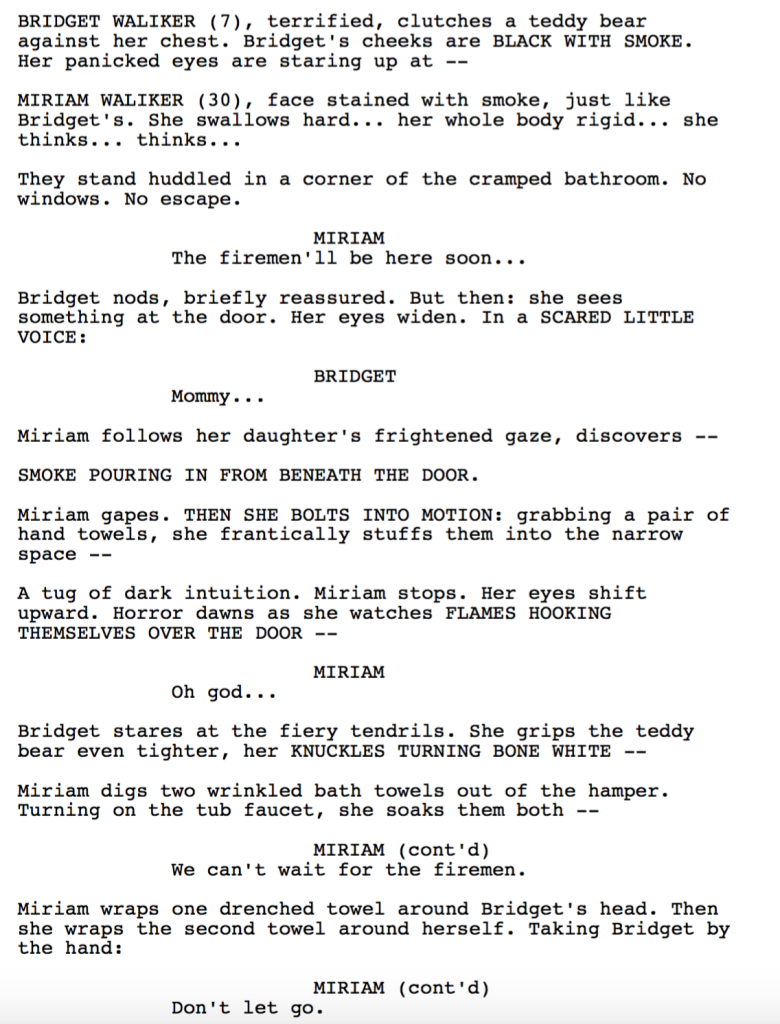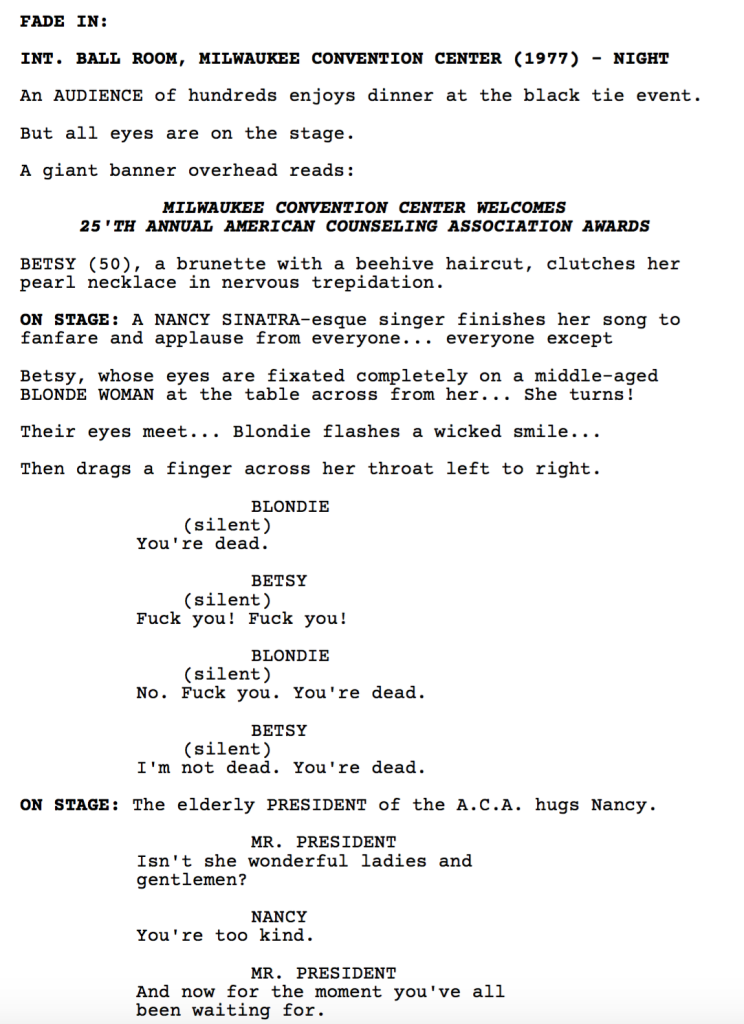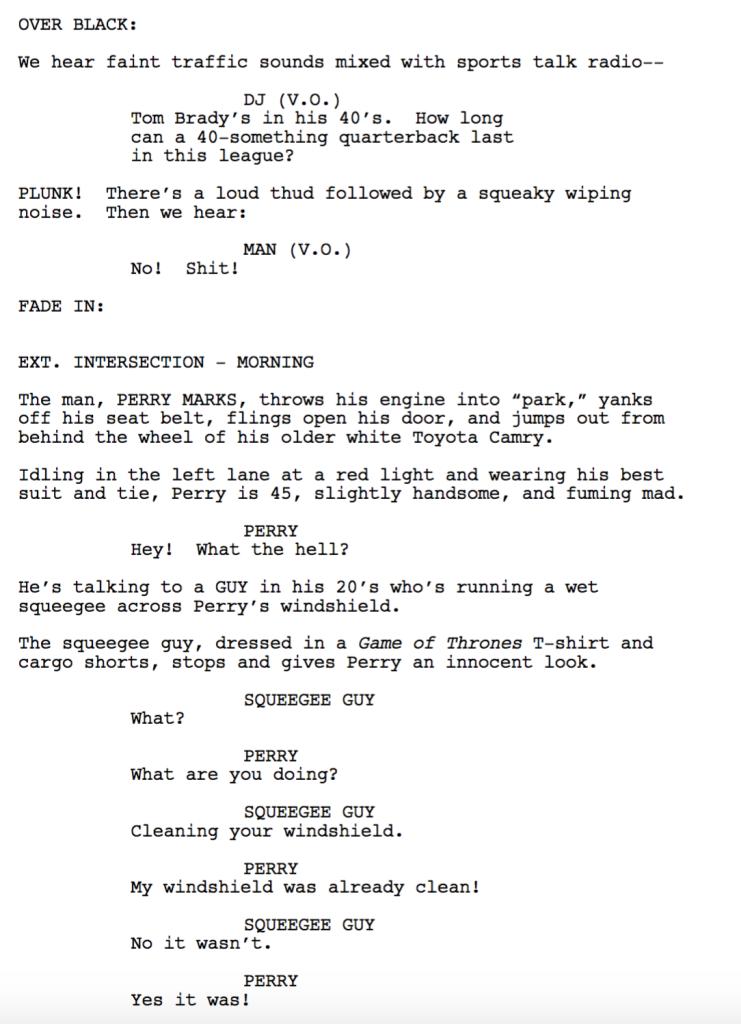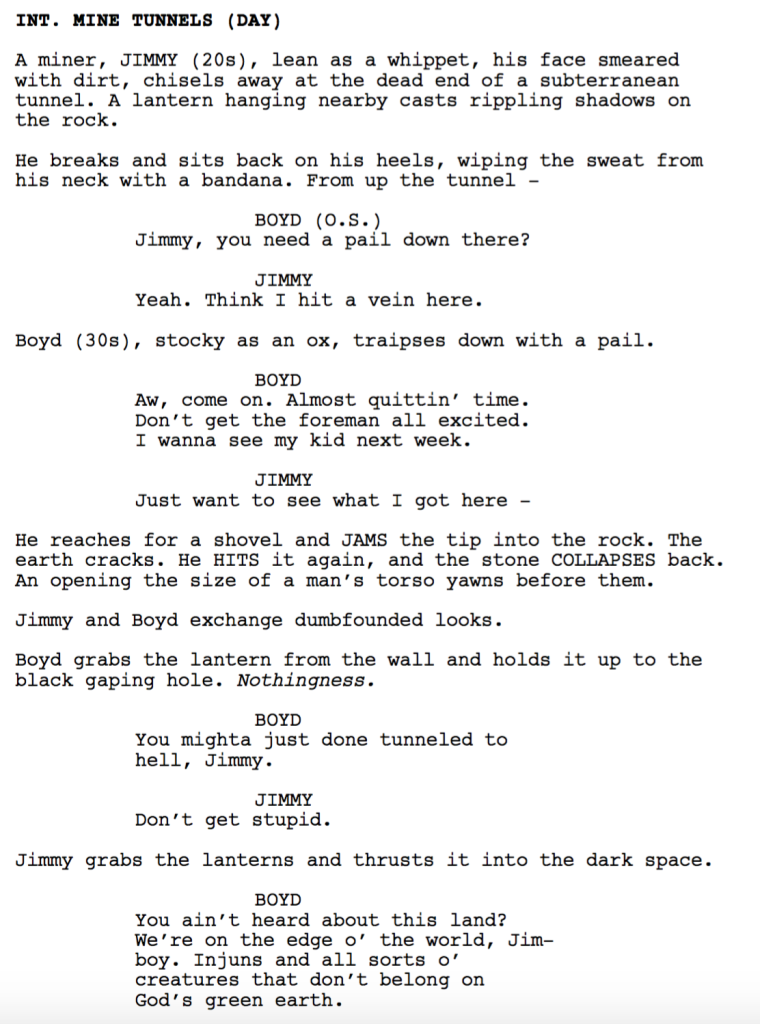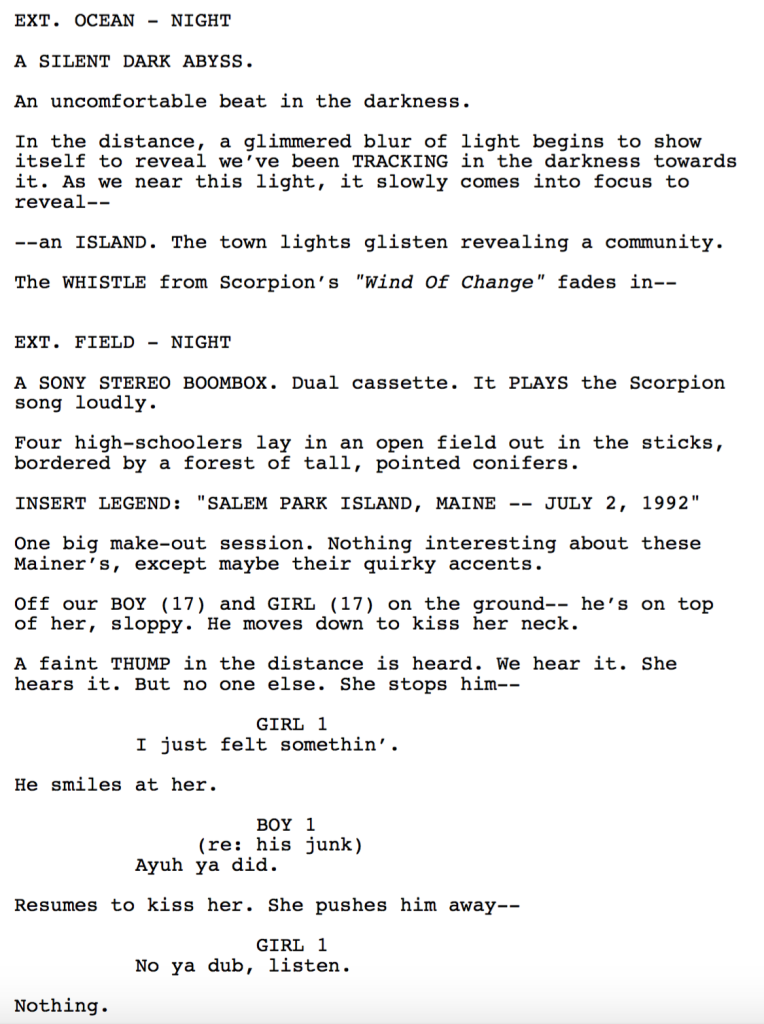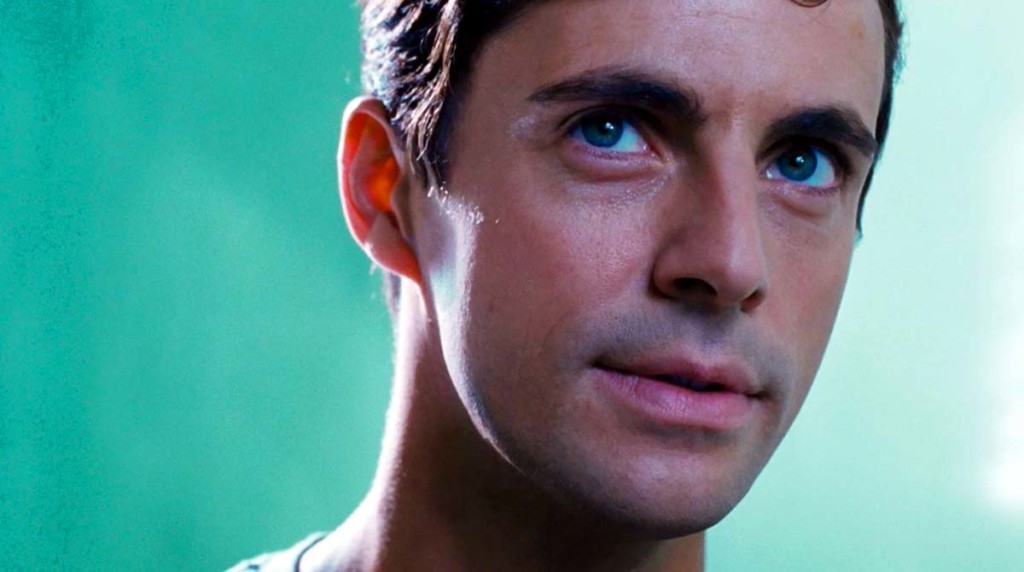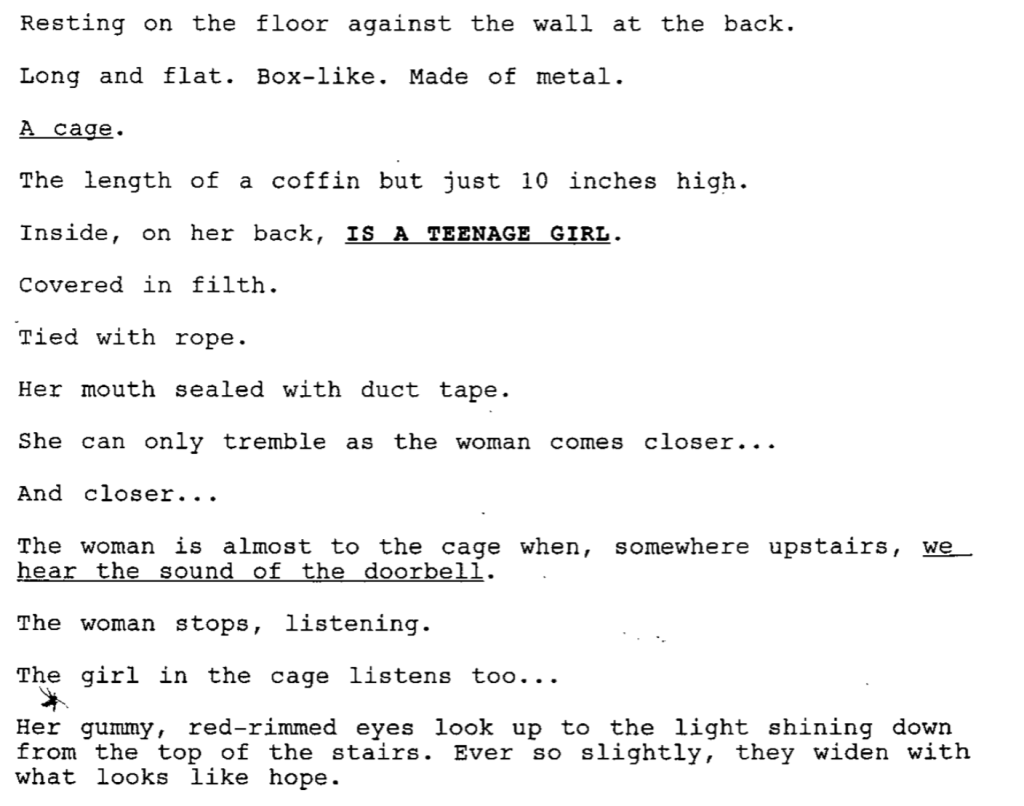Search Results for: F word
You guys have been KILLING IT with the submissions and the votes. We continue to find and celebrate good writing. Let’s do it again this week. What do you say!
By the way, I’m probably going to be reviewing Stephen King’s Gerald’s Game on Monday. So if you have Netflix, watch it so you can participate in the discussion. It’s the ultimate Contained Thriller and a huge writing challenge (which is why it’s taken so long to make). But I hear the writer nailed it.
How to play Amateur Offerings: Read as much of each script as you can and submit your winning vote in the comments section. Votes will be counted through Monday, 11:59pm Pacific Time. Winner gets a script review next Friday!
Title: Human-Like
Genre: Horror
Logline: After learning her deceased mother might still be alive, a young woman traces the mystery to an abandoned farmhouse occupied by eerie mannequins – mannequins that move when no one’s looking.
Why You Should Read: Haunted dolls/puppets/mannequins. Staples of the horror genre for decades. But here’s my problem: most of the time, the real threat turns out to be something else — like ghosts or a masked killer. Did Annabelle even blink? Of course, there’s the “Child’s Play” and “Puppet Master” movies, but those are closer to black comedies. “Human-Like” is my attempt to create a sincere, creepy film that delivers on the promise of inanimate objects coming to murderous life. The story was inspired by the John Lawson house in upstate New York, a supposedly abandoned residence with oddly dressed mannequins on the porch. When I read that, I knew immediately – horror film! Thanks for your time and I appreciate any thoughts you might have.
Title: Therapist of the Year
Genre: Comedy
Logline: A marriage counselor’s quest for the coveted therapist of the year award gets put in jeopardy when the world’s worst couple decides to blackmail her into taking them on as clients.
Why You Should Read: A hysterical breakdown of relationships. A rounded ensemble of oddball and memorable characters. Billed as “It’s Always Sunny in Philadelphia” meets “What About Bob”, Therapist of the Year is guaranteed to make you laugh and possibly even cry, as well as providing a litany of unforeseeable plot twists, generally not seen in the broad comedy genre, which will keep the audiences at the edge of their seat.
Title: Anything Helps
Genre: Dramedy
Logline: An ad agency copywriter feeling unfulfilled at work and annoyed by recent run-ins with pushy panhandlers decides to leverage his marketing expertise to become the Don Draper of beggars.
Why You Should Read: I’m a huge fan of Sorkin, Mamet, and Tarantino for their dialogue-driven scripts. If you like dialogue-driven scripts, I think you’ll like this one.
Title: The Firefly Gang
Genre: Western Action-Adventure
Logline: When a young girl’s family is threatened over unpaid debts, her older brother goes after the bounty on a killer bear. When he doesn’t return, she pulls together a rescue party of ragtag friends to find him, venturing out into a Wild West full of bandits, native tribes, and monsters.
Why You Should Read: My partner wanted to write a monster movie. I wanted to write a Western. So we did. Our last monster script placed in the quarter-finals of the Nicholl, so it was a challenge to take that similar element in a new direction. This is pure adventure in cowboy land, driven by heart and studded with the fantastical. It’s Stranger Things meets True Grit. It’s a movie on the page.
Title: Leo In The Dark
Genre: Sci-Fi, Drama Adventure
Logline: When a grieving man stumbles upon a strange camera that can peer into the ghost world, he sets out on a journey to find his late son and find the closure he never got… But as the owner of the device comes after him for it, a deeper plot begins to unfold that not only puts his son’s ghost in danger, but his living family as well.
Why You Should Read: You reviewed a much earlier draft of this script back in 2013 and told me verbatim, “you have what Hollywood needs — an original mind”. You called my story Chinatown meets Ghostbusters, but it needed to be drastically simplified. In the 4 years since, I moved on to focus on producing and sharpening my writing craft—writing one other feature and two pilots. Earlier this year I had a cathartic moment: I decided that if I could only tell ONE story in my life and get it made into a film, it would be this earlier story you reviewed. SO, I dedicated 2017 to revising this story, taking the common denominator of notes I received professionally, and tweaking… And here it is. Based on your film sensibilities, and focus on theme, I truly believe you will love this revised, simplified script. It’s story world is Maine in 1992; Amityville meets Derry. Hope you enjoy.
Carson does feature screenplay consultations, TV Pilot Consultations, and logline consultations. Logline consultations go for $25 a piece or 5 for $75. You get a 1-10 rating, a 200-word evaluation, and a rewrite of the logline. All logline consultations come with an 8 hour turnaround. If you’re interested in any sort of consultation package, e-mail Carsonreeves1@gmail.com with the subject line: CONSULTATION. Don’t start writing a script or sending a script out blind. Let Scriptshadow help you get it in shape first!
It’s the goal of every producer in Hollywood, the dream of everyone who’s ever had an idea for a TV show – to not only create a hit show. No no. Creating a hit show is easy. But to create a WATER COOLER show – the kind of show that’s so good, so exciting, so twisty-and-turny, that people MUST talk about it the next day. Let’s list some of these shows.
But before we do, let me put the needle on the record of some Barry White. Get a good vibe going. Oh yeah, can you hear Barry? I can. Okay, let’s get to that list…
Lost
Breaking Bad
True Detective
Walking Dead
Game of Thrones
This Is Us—
SCRAAAAAAAAAAAAAAATCH
I’m sorry. Run that last show by me again. This is Us??? A show about family with no dragons, no drug dealers, no serial killers, no zombies, and no Others. The show is just about… people? How did a show that ONLY explores interpersonal relationships become so addictive? And what can we learn from it that we can apply to our own TV writing?
Water cooler shows used to be common. That’s because only 30 shows aired a week and even the lowest rated shows did better than the highest rated shows today. Everybody was watching the same stuff so, chances were, you’d want to discuss the latest episode of Seinfeld with your co-worker the next day. Today, with 300+ shows a week to choose from, everybody can pick their own little weird show to watch. And that means writing a show that a lot of people watch and that generates widespread discussion has become almost impossible.
Every network wants the next Game of Thrones but what does that even mean? You can’t just make another swords and sandals dragon show or else it looks like a cheap version of Game of Thrones. The same thing happened when Lost was big. Everyone wanted the next Lost. But you couldn’t replicate Lost. It was too unique.
Enter “This is Us,” the most unlikely water cooler show of them all. And maybe that’s our first lesson of the day. Whenever there’s a mega-hit show, the collective industry response is to try and copy it. But what you’d be better off doing is finding something that’s the opposite, which is what This is Us is.
But that doesn’t explain how this show got so buzzy. Once again, the show relies solely on internal and external character conflict to drive episodes. So how can it possibly compete with a show that spends 25 million on movie-level battles every other other week, or kills off multiple beloved characters in a singular blood-curdling wedding? It seems impossible.
For those who haven’t seen This is Us, go watch the pilot right now. I’m serious. Stop reading this and watch the pilot, because it’s one of the best written episodes of television ever. Also, it’s impossible to talk about the show without indirectly spoiling the pilot. And I need to get into the pilot to explain why this show is so buzzy. Okay, did you watch it? Are you sure? Cause every sentence going forward is a spoiler. You’ve been warned!
For those who don’t have the time, This is Us follows “triplets” Kevin, Kate, and Randall Pearson. Kevin is a handsome successful sitcom actor who decides to quit his show to pursue theater in New York. Kate is his extremely obese manager whose entire life revolves around trying to lose weight. And Randall, who is black and was adopted by the same parents of Kate and Kevin, is an extremely smart and successful businessman with a great family.
The show, however, doesn’t just cover the triplets in the present day. Half of every episode is dedicated to 30 years ago, where we show their parents, Jack and Rebecca Pearson, going through the struggles of being a young couple trying to raise three kids.
There is one more major plotline, which is that Randall seeks out his biological father, William, who left him at a fire station that night that Jack and Rebecca adopted him. Randall learns that William is dying, and extends an invitation to move in with him and his family, where he learns about William’s unique life as a struggling artist/addict.
Okay, now that we’ve got the basics, let’s get to why this show, which, once again, is just about people, is able to compete on the same buzzworthy plane as Game of Thrones. We’ll start with the number one reason, which I’m guessing nobody here picked up on. If you did, kudos to you. Cause it took me awhile to figure it out.
This Is Us’s PAST-PRESENT structure allows it to introduce sexier twists and turns than your average character-based show.
Case in point: The pilot. This is Us hides the fact, with clever directing, that Jack and Rebecca’s storyline – they’re at the hospital about to have triplets – is happening in the past. It also hides the fact that Randall, who’s black, is in any way related to Kevin and Kate. This allows them to throw a quadruple-whopper at us in the pilot’s climax. Jack and Rebecca’s storyline is set in the past, one of their triplets dies during birth, Jack and Rebecca decide to adopt Randall, who was dropped off to the hospital during delivery, which, of course, means that Kevin, Kate, and Randall are all siblings in the present. Wow! Now that’s writing.
However, even after the gig is up on the hidden past storyline, This is Us still uses it to deliver dose after dose of surprises. For example, at the end of the second episode, Randall, Kate, and Kevin’s parents stop by the house. “Grandpa and Grandpa are here!” Randall’s daughters excitedly yell. We open the door to see Rebecca…. but she’s not with Jack. She’s with Jack’s best friend. Cut to black. End of episode. WTF. This is a twist you can only pull off inside of this unique PAST-PRESENT format. And This is Us goes back to that well again and again (mostly to success, but not always).
It’s funny, when I looked up at my list of water cooler shows, I noticed there are two others that use this exact same format – Lost and True Detective. So there’s obviously something writers have discovered that’s like this little miracle worker for twists. Nobody had figured out how to do that for a character-driven show yet, though. So kudos to Dan Fogelman, the creator of This is Us, for doing so.
From there, This is Us utilizes good old fashioned solid-writing to make sure you love it. In television, your primary job in the pilot is to make us either a) fall in love with or b) be intrigued by each and every character. If you can accomplish that, it’s an investment that pays dividends for a loooong time. We’ll endure some bad episodes if you’ve given us characters we love. And This is Us has some bad episodes. But I don’t care. Because I want to see if Kate’s going to prioritize her relationship over her eating issues, if Kevin ends up with the playwright, or how Will, the biological father dying from cancer, is holding up.
This is Us also utilizes a cheap, but effective, tool for keeping its show buzzworthy. It’s not afraid to kill people. Or, when it isn’t killing people, it’s coming damn close to it. When you look at all those buzzworthy shows – Walking Dead, Game of Thrones – they love to kill off characters. And look at the time tested TV genres – cop shows, medical shows – death is basically built into their DNA. This is Us understands that just having a bunch of people lollygagging around, sharing jokes, isn’t enough. There had to be the threat of death hanging over each episode to give the show weight and generate discussion.
In closing, let me offer you some TV writing advice. And this extends to the feature world as well. I have no problem with writers capitalizing on trends. If you’ve got a Game of Thrones like show that takes place in a completely different setting and feels new and fresh, that’s a powerful marketing tool for you when you go out and pitch it. “I’ve got the next Game Of Thrones” does perk up some ears. However, remember that TV producers hear “I’ve got the next Game of Thrones,” all the time. So going in the completely opposite direction, like Dan Fogelman did with This is Us, may be just as lucrative.
The other day, I was talking to a friend. He’s more a director than a writer. So he doesn’t write unless he has to. And it so happens this is one of the rare times he’s writing one of his scripts. He said he could use my help. So I met with him and we talked through a bunch of ideas regarding the characters and the plot, and by the time I left, I felt like the script was ready to go.
A couple of days later I called and asked how the writing was going. “It’s not,” he said. I naturally asked, “Why not?” There was a long pause. “Because I don’t even know where to start.”
I live and breathe screenwriting. I know all the ins and outs of the medium. So it’s easy for me to forget that for many people, looking at 110 blank pages is like looking down into an endless black hole. The prospect of knowing where to begin, and then of how you’re going to fill in all those pages, seems impossible.
I’m hoping to erase that fear today. To give you all a little guidance. You see, to write a great script, your writing must have PURPOSE. We, the reader, must feel like you have a plan in place – that you’re bringing us somewhere. So before you do anything with your script. Before you write a single word. You need to know HOW YOUR STORY ENDS.
Think about it. How can your driving have purpose if you don’t know where the trip ends?
I call this: The Check Point Method.
You set yourself a series of check points to write towards. And you start with your ending. That’s going to be your final check point.
How do you come up with an ending if you haven’t even started your script yet? It’s easier than you think. What is the problem that sends your hero on his/her journey? Once you have that, you know what they must do to solve the problem. And the climax will be their attempt to solve it.
In Wonder Woman the problem is the evil German baddie who’s waging World War 1. The climax, then, will be her battling that villain, trying to take him down.
If you were to, say, came up with an idea about a group of kids in a small town who start seeing a creepy clown, it’s pretty clear how that script should end. They will have to battle the clown! So there you go. You’ve just identified your climax. Which gives you your first check point to write towards.
BUT.
That check point is still really far away, isn’t it? You’ve given your script SOME purpose. But it still has the potential to wander around in circles before it gets to that final check point. Which means we need MORE check points!
The big plot beat that comes before the climax is the second act climax. What typically happens at the end of the second act is you main character reaches his lowest point. The bad guy gets away. The hero loses his girlfriend. Your NAVY SEAL’S entire team is killed. Your character has hit rock bottom.
Which means that for your second check point, all you have to do is figure out how your hero reaches his lowest point. In “It,” for example, all the friends get in a fight and break up. They leave one another. How the hell can they defeat It if none of them are talking to each other? Look at that. Another check point’s been added that’s even closer to the start of the script than the climax. All of a sudden, this giant black hole isn’t looking so giant anymore. Crafting a story starts to seem possible.
Let’s keep it rolling and find another major plot beat that happens even closer to the beginning. For example, in “It,” you have that haunted house the kids always see. You know you’re going to have to build a set piece into that haunted house somewhere. You may not know what the scene is yet. But you know something big needs to happen there. So, once again, you make that another CHECK POINT. “Kids get stuck in house for some reason. Major battle occurs there.” We’ve just added a third major check point to the story. This isn’t looking difficult at all.
By this point, we’re almost backed up to our midpoint. The midpoint is usually when a major plot beat occurs, something that adds another dimension to the story or sends it off in an unexpected direction. You could argue that in “It,” this occurs when the “Losers Club” fends off the bullies and befriends Mike Hanlon. A new member has joined the group. An EVEN CLOSER check point to write towards. The script, now, is even smaller.
We also know that early on, we want a series of scenes where It scares the children. That can become our first major check point of the movie – “Each kid gets scared by It in a unique way.” That means that after your script’s opening, when you set up your characters, you have FIVE CHECK POINTS to write towards.
1) Series of scenes where kids get scared by It
2) The Losers group befriends Mike Hanlon after fighting off the bullies.
3) Big haunted house set piece.
4) Friends break up.
5) Friends battle It.
The idea with these check points is to make it so you always have something to write towards, which means your story always has purpose. If you don’t set up these check points ahead of time, you’ll find yourself scrambling for plot ideas and story directions, which inevitably lead the story nowhere. If you’ve ever run out of steam on a screenplay around pages 40-60, this is usually why.
Now remember, you don’t have to limit yourself to five check points. You can include as many check points as you want. And I’d argue that the more you figure out ahead of time, the better. The writers of “It,” for example, may have known beforehand that they wanted “It” to kidnap Beverly near the end, which motivated the Losers to regroup and go after It. So you’d slip that check point in between numbers 4 and 5.
To truth is that the less check points you have, the more likely you are to get lost. If you have to cover even 20 pages in your script with no check points to write towards, there’s a good possibility that that section will lose focus.
Also, you don’t have to start at the climax like I did and work your way backwards. I just find it easier because the two easiest plot beats to figure out are the Climax and the Hero’s Lowest Point. And both are at the end. Feel free to start forming check points at the beginning if you want. Just make sure you have your ending figured out before you start writing. That’s the one non-negotiable check point. Your climax guides the entire story as well as all the check points before it. So you want to have that one down.
I find that one of the most common issues in amateur screenplays is an unfocused narrative. The writer doesn’t have a plan. And a lot of that comes from not having your major plot beats figured out ahead of time. Figure those plot beats out, CHECK POINT THEM, then write towards each, one at a time. Keep it simple guys. That’s the name of the game.
Logan Martin’s script, “Meat,” becomes the first amateur script to make it into my Top 25 in over 5 years!!
Genre: Mystery/Horror
Premise (from writer): A misanthropic man notices bizarre changes in himself, his wife, and the animals inhabiting the territory around their homestead as they attempt to survive self-imposed isolation.
Why You Should Read (from writer): After moving from North Dakota post-college at the end of 2016, I started to write scripts in my spare time and fell in love with it. My first screenplay placed in the top 20% of the 2017 Nicholl fellowship, and as of now I’ve “finished” five features and am working on my sixth. I aim to create original, meaningful stories, but even more so focus on presenting them in a unique way. MEAT has been compared to The Witch by readers due to its low budget, as well as its setting and tone. It’s an unconventional horror story that poses a moral question without appearing pretentious.
Writer: Logan Martin
Details: 72 pages!
Okay, I have to admit I’m a little nervous. I like this script so much. And I’m afraid I’m not going to convey all the reasons why in this review. I’m not going to articulate something or I’m going to forget a key reason for its awesomeness.
But the biggest thing I want to get across is that this is one of the best ways to break in as a screenwriter. Find a topic that interests you, come up with a story, then tell it in a way that best shows off your voice.
Because beyond this just being a great script, it’s a tremendous showcase for the unique way in which the writer sees the world.
Does that mean Meat’s perfect? That’s a tough question to answer. It’s perfect for what it is, for what it’s trying to be. But as a piece of screenwriting, it’s filled with lots of “mistakes” and rule-ignoring. However, I contend that following the rules is how you write a good screenplay, but breaking the rules is how you write a great one.
Meat introduces us to 30-something couple Ben and Rein. Ben and Rein are normal adults in every way but one – they live in the middle of nowhere, off the grid.
We learn later that they both had normal jobs, lived in the city. But at a certain point they became exhausted by the monotony of it all – the rat race, that thing all of us get sick of sooner or later. The difference is, Ben and Rein decided to do something about it. Or, maybe it was more Ben than Rein. But we’ll get into that more in a second.
When these guys say “off the grid,” they really mean, “off the grid.” To the point where they’re hunting their own food. Ben enjoys the thrill of the hunt, and he’s got a particularly healthy deer population to shoot away at. They also have rabbits skittering about, chickens, and a couple of pigs (Bert and Ernie) in their mini-barn next door.
Every night, Ben prepares some juicy red MEAT for dinner. He takes pride in the fact that he’s killed and prepared the meal. So there’s nothing that makes him happier than sitting with Rein after a long day and eating. That juicy bloody dripping red… meat.
The only thing left in life that agitates Ben is going into town. There are still supplies the two can’t obtain on their own. And so a few times a year, Ben has no choice but to make that trip to the grocery store and stock up on necessities. Ben dislikes his latest experience so much, he proposes to Rein cutting the store out completely so that they’ll finally, officially, off the grid. Rein’s hesitant but if it’s what Ben wants, she supports him.
As the days go by, we get the sense that Rein is having some regrets about this new life of theirs. It’s not blatant. She’s always agreeable and on board with her husband’s choices. But Rein may not have envisioned that “off the grid” was this off the grid.
And so one day she drops a bombshell on Ben. She no longer wants to eat meat. Ben stares at her, stumped. Hunting, preparing, cooking – they’re his favorite thing to do for her. “Why?” is all he can think of to say. While she doesn’t say it then, it’s clear that the process of killing animals and eating them has started to affect her. “Well, if that’s what you want,” Ben concedes.
And while they don’t know it yet, that tiny choice is the beginning of the end. Without a sufficient amount of food and protein, Rein starts getting thinner and thinner. Ben is increasingly frustrated with her decision, but he’s dealing with his own issues. Not long after that day, Ben goes hunting, and when he lines up a deer in his scope, he sees that a second deer, next to it, is… STANDING UP ON TWO FEET. As if talking. Ben lowers the rifle to watch the deer disappear into the woods.
Ben’s shaken by the experience as it was just so real.
As time goes by, Rein becomes more resistant to Ben’s hunting, and seems to be getting too close to the animals, particularly Bert and Ernie, their pigs. One day, one of the pigs gets out of its pen, and Ben goes chasing after it, following its tracks in the snow. To his shock, after awhile, the tracks turn from four separate feet… to just two.
And if that isn’t bad enough, the next time Ben goes hunting, he gets shot at. What the hell is going on? When he comes home later to find that Rein has made dinner with three table places instead of two, the truth of just how fucked up things have gotten comes to light. But what Ben doesn’t know is that it’s gotten far worse than he can imagine. And that he finally may be the hunted, rather than the hunter.
Oh man. Where do I start with how good this was!
Let’s start at the top and discuss the TENSION in Ben and Rein’s relationship, something that was felt from the get-go. This choice was paramount to the script working because, remember, 80% of this script is two characters. So you need some sort of conflict to make that interesting for that long. By adding this underlying tension to Ben and Rein’s relationship, you build SUBTEXT into every conversation they have. Every word has an additional meaning. A simple “How are you?” doesn’t mean “How are you?” It means, “Why aren’t you talking to me? Why are you acting so weird? Did I do something wrong? I’m trying to be respectful here and not push but I’m getting frustrated.”
This is something newbie screenwriters don’t get. Every time a character in one of their scripts says, “How are you?” it literally means, “How are you?” Which is boring. And that’s not to say sometimes “How are you?” can’t mean “How are you?” But it’s when EVERY line is literal that dialogue becomes patently boring. This is where the critique, “Your dialogue is on-the-nose” comes from.
Martin needed to stick the landing on that relationship because, as many of you noticed, there wasn’t any GSU in Meat! “Yo Carson. Didn’t you say all scripts need GSU to be good? Why you lie?” Sheesh, get your bloody meat hooks off me. GSU is the main ingredient required for mainstream genre screenwriting – horror, thriller, action, adventure, sci-fi. But it isn’t a writer’s only option. And it’s used less frequently with indie fare, which is what Meat is.
If you’re not going to utilize the GSU formula, your next best option is creating a dramatic question that drives the narrative. That’s a fancy way of saying: Have an overarching question that the audience wants to see resolved. In the case of Meat, it’s “Are these two going to make it?” It will, of course, be up to the individual reader to determine whether that question is interesting enough for them to be invested. And I would assume that, for some of you, it wasn’t. You didn’t care if these two “made it” or not.
This is the danger of moving away from heavy horsepower storytelling tools like GSU (goal, stakes, urgency). Is that people with short attention spans or less interest in the psychological battles of characters aren’t going to jump on board.
But see, this is why I think Meat is so great. It’s not just about the frame-battle between its two main characters. Martin starts adding little mysteries here and there that add layers to the story. When Ben starts seeing animals propped up on two legs talking, it’s like, what the fuck is going on? And when he starts getting shot at, it’s like, who’s shooting at him?? It could be their neighbors, it could be Rein, it could also be… the animals he’s been hunting.
And there’s actually one big advantage to a non-GSU script. It’s easier for the writer to stay ahead of the reader. If your hero has a clear goal, like getting the Ark of the Covenant or killing the terrorists, there aren’t a ton of ways to achieve that goal. As readers, we have a good sense of how things are going to play out, even if we don’t know the exact path by which we’ll get there.
Without that clear end point, the writer can yank the reader around in a multitude of unexpected directions because the narrative isn’t being pulled towards an obvious one (kill the terrorist). And that’s why I enjoyed this so much. I had no idea where it was going, pretty much up until the final page. And I can count the number of times that’s happened in the past year on one hand.
Now a lot of you may point out the short page count. And yes, I agree that that’s a problem. The industry standard for a feature is between 90-120 pages, with the sweet spot being between 100-110. However, if you are going to make a mistake in this area, it’s better to be on the low end (less than 90) than the high (over 120).
I fought with the 75 page count for awhile, wondering if it was because of the lack of dialogue. Dialogue takes up more space, so if you don’t use a lot of it, your script is going to be shorter. And there wasn’t a lot of dialogue here. Which I liked, by the way. It made it so that each time there was a conversation, that conversation had weight.
In the end though, I think this needs to be beefed up (no pun intended). You need one more subplot. And I’m not sure where that’s going to come from. I’d love to hear your suggestions in the comments. I’m thinking Ben gets most of the focus here. So a subplot that focuses on Rein would be nice. Maybe something where she spends more time with the pigs and chickens, especially since the pig payoff in the end is so great. If we can just get this up to 85 pages, I think you’ve got enough for a feature.
Man, I really liked this. Never has a sentence as simple as, “I don’t want to eat meat anymore,” shaken me so much. And that’s a testament to Logan and his amazing ability to capture the depth of this fractured relationship. I mean hell, this script even had a dream sequence in it (a HUGE Scriptshadow no-no) that a I liked. Has the screenwriting sky fallen?
I would love for “Meat” to get as much publicity as possible because I think it deserves to make the Black List. It’s exactly the kind of script they used to celebrate before they went all true-story/biopic. Hopefully the industry recognizes that it’s still possible to write original unique stories. Great job, Logan. I hope this script jump-starts your career!
Script link: Meat
[ ] What the hell did I just read?
[ ] wasn’t for me
[ ] worth the read
[x] impressive (Top 25!!!)
[ ] genius
What I learned: Learn to dramatize your ideas. Say you want to make a statement about our society’s obsession with killing and eating animals. The bad writer will come up with a series of scenes of characters debating the issue. “Meat eating is bad.” “But we were put on this earth to hunt. We need food.” “If slaughterhouses had glass walls, no one would eat meat anymore.” Watching and listening to shit like that is nauseating. As a writer, what you want to do is DRAMATIZE your idea, like Logan did with “Meat.” In order to make a statement about this topic, he placed two characters up in the middle of nowhere where they had to hunt their own food then had one of the characters no longer want to participate, leading to an organic exploration of the moral implications of an animal-killing meat-eating culture. Always look to dramatize your ideas!
Genre: Drama/Horror?
Premise: A man who’s lived his entire adult life in a mental institution obsessing over the beautiful niece he’s never met, finally decides to leave and find her.
About: Ted Foulke, aka Wentworth Miller, became a tour de force on the screenwriting circuit back in 2010, selling two scripts, Stoker and The Disappointments Room, back to back, winning over Hollywood with his sophisticated, intelligent, dark voice. Stoker became a huge project, attracting visionary South Korean director Chan-wook Park (Oldboy, Lady Vengeance, The Handmaiden). But something fell through the cracks during the adaptation, and the movie performed badly at the box office, disappearing out of the public eye almost immediately. The Disappointments Room, the more commercial of the two projects, didn’t fare much better, getting caught in the Relativity meltdown, ultimately dumped into the VOD market without any promotion. Today’s script, “Uncle Charlie,” is a prequel to Stoker.
Writer: Ted Foulke (Wentworth Miller)
Details: 119 pages
There was a good one year period there where Wentworth Miller was considered the best up-and-coming screenwriter in Hollywood. He wrote two specs, Stoker and The Disappointments Room, that wowed the shit out of anybody who read them. There was a depth and attention to detail that was absent from all the vapid empty scritps selling at the time, and just an interesting dark voice at the center of it all, giving us stories we’d never quite seen before.
But then the movies came out and they were… ignored. And I have a theory on that. Films that fall under the horror tag but don’t contain supernatural elements struggle to find an audience. There are exceptions to this. If the scripts have a big flashy hook (Get Out or The Purge), they can work. But if you have something like Stoker, where it isn’t 100% clear when you watch the trailer what genre we’re in or what kind of story we’re watching, that’s going to keep people out of the theater.
And the problem with Miller is that he actually makes his scripts intelligent. Which, funnily enough, alienates audiences even more. If he could just dumb it down a little (throw a killer clown in there), I’m sure he’d be one of the biggest horror screenwriters in town. I’d love to see a Miller supernatural horror film. I think it would be awesome. But for right now, we have his prequel to Stoker, Uncle Charlie. Let’s check it out.
“Uncle Charlie” starts out explaining that this a prequel to Stoker, and therefore if you don’t know that film, you won’t be able to appreciate this one. That’s a tricky choice because I don’t remember much about Stoker. But I do remember that a teenage girl named India loses her father and she and her mother move in with his mysterious brother, Uncle Charlie.
What we come to know later in the film is that Uncle Charlie has spent nearly his entire life in a mental institution. And that’s where we find Charlie here, a year before the events of Stoker, pulling off his best One Flew Over the Cuckoo’s Nest impression, wrecking havoc on his version of Miss. Ratchet, Doctor Walker. Charlie could’ve left this place years ago. He was actually able to leave the day he turned 18. But he CHOOSES to stay here.
When Charlie’s not making Doctor Walker’s life miserable, he’s drawing pictures of India. This part I didn’t understand. As far as I can tell, he’s never met India. So I don’t know how he can draw her so well. Maybe he’s seen pictures of her?
Meanwhile, back at the farm, India divides her time between going to school and taking piano lessons with her new teacher, Miss Price. Miss Price is an excellent teacher minus the fact that she moves from town to town, torturing and killing her students. In fact, she’s got one locked up in a cage in her basement right now. One that will have to be “taken care of” in order to make room for an unsuspecting India.
Over at the nut house, Uncle Charlie finally decides to flee the coup, illustriously turning Dr. Walker into a vegetable before doing so. And the first place he goes is India’s town. He’s got to meet his obsession, of course. He gets there right when India goes to her first high school dance. And let’s just say he “takes care” of India’s date so that she’s free.
That night, after the dance, India runs into Miss Price, who “happens” to be driving by, and who offers India a ride home. But, oh yes, she wants to stop by her house first to “show India something.” We all know where this is going. However, what Miss Price doesn’t know is that India’s got a new guardian angel. A very dangerous new guardian angel.
If yesterday’s prose annoyed you and you prefer a more classic writing style, this script is for you. Miller’s prose is simple, efficient, descriptive, and flows better than any script you’ll read this year. It’s what makes his scripts so easy to read, which, in this case, was necessary, since the story itself doesn’t stack up to his previous entries.
The problem is that Miller handcuffs himself with the prequel treatment. Prequels never work. Ever. I’m not sure why writers like them. They’re one giant narrative fork in the road where every path you take leads to a dead end. George Lucas painfully found this out when he started writing Episode 1. Wait, I have to keep two of my biggest characters, Obi-Wan Kenobi and R2-D2, apart for 99% of the trilogy?
Uncle Charlie follows two separate storylines, Uncle Charlie’s and India’s, and while these storylines want to find each other, or, at the very least, intersect, they can’t. Because in the next movie, Uncle Charlie and India meet for the first time. Miller tries. He tries his darndest, even cheats to give us that crossover moment. But the storylines never overlap in any meaningful way, which leaves the reader wondering, what was the point?
Another issue is that the script’s best plot thread, the serial killer piano teacher, is operating at a net negative. We know Miss Price can’t kill India because India appears in the next movie. And if you don’t have the uncertainty of whether India will succumb to this monster or not, where is the suspense? These movies only work if they’re suspenseful. So if your splashiest storyline can’t mine that tool, what’s the point?
You also run into issues like, what are the chances that so many killers are randomly intersecting in life? What are the chances that this girl has a serial killer uncle AND a serial killer piano teacher? Audiences start asking themselves these questions. And the answers are what break the suspension of disbelief.
“Uncle Charlie” also reminded me of a problem I had with Stoker. India isn’t an interesting character. I’ve told you guys this before. Be careful about making your main character a sociopath, eliminating all feeling and personality from them. These people walk around emotionless for 100 minutes, leaving the story feeling empty and cold whenever we’re around them. Miller tries to balance this out with the wackier more expressive Uncle Charlie, and it works to an extent. Uncle Charlie is a compelling character to watch. But like I said, the narrative is so handcuffed by its inability to intersect, it ultimately doesn’t matter.
“Uncle Charlie” is a fun and easy read for those who like reading scripts. But there’s neither a hook or a plot here that necessitates it becoming a movie. If Miller were to ever pursue this, it’d be in his best interest to eliminate the India side of the story and watch Uncle Charlie go off on some adventure. There are plenty of fun threads you could find there.
Old School Scriptshadow Script link: Uncle Charlie
[ ] What the hell did I just read?
[x] wasn’t for me
[ ] worth the read
[ ] impressive
[ ] genius
What I learned: Prose is simplicity. Miller is known for having some of the best prose in the business. But note how his description usually stays between 1-3 lines long. Note how he doesn’t use SAT words. Note how a lot of his prose breaks down to short fifth-grade level sentence structure. “Uncle Charlie” is right up there for you to download and see for yourself. A lot of beginner writers would do well to study it.


